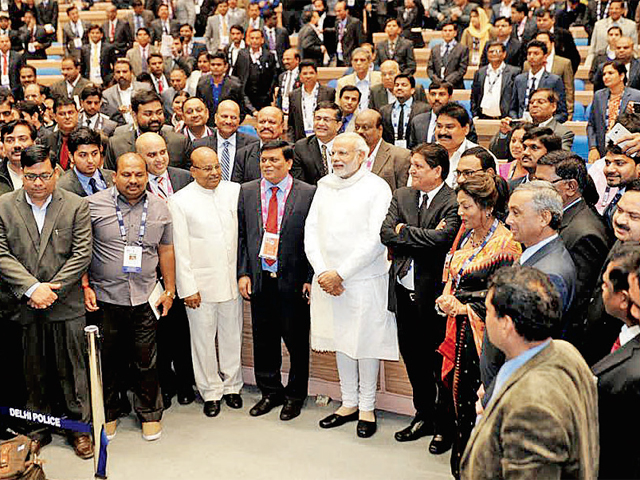Indian business has long been represented by Ficci (Federation of Indian Chambers of Commerce and Industry). The new kid on the block is Dicci – the Dalit Industrial Chambers of Commerce and Industry. It boasts of nearly 4,000 members, heralding the new era of Dalit businessman. This represents a social and economic revolution.
Last week, Prime Minister Narendra Modi inaugurated a Dicci meeting of over 1,000 Dalit entrepreneurs. Modi said he would like to double the number of Dalit entrepreneurs in two years through access to the Pradhan Mantri Mudra Yojana (PMMY), which gives loans of up to Rs 10 lakh to small businesses. He said BR Ambedkar rightly understood that empowerment required Dalits to break traditional occupational bonds and become businessmen in their own right. Modi urged Dalits to reach for the sky, stand tall and become job-givers instead of being just job-seekers.
The media paid little attention to this event, and so missed a political transition in the making. Since Independence, the Congress has viewed Dalits as its own vote bank, and claimed to further the interests of this caste through job and educational reservations. Its current platform is to extend these reservations to Dalit Muslims and Christians. For the Congress, Dalit voters are poor people in desperate need of subsidies, freebies and reservations.
Not Only a Vote Bank
Given this approach, it is no surprise that Rahul Gandhi never agreed to address or embrace Dicci, even when this was suggested by some advisors. The Congress was not comfortable with the idea of Dalits becoming millionaires. It preferred to see them as objects of pity, not objects of envy. It preferred to proclaim that its heart lay with poor Dalits, rather than celebrate with those that had crashed through income barriers and become the ‘suited-booted’ types that Rahul Gandhi rails against in the fond but mistaken belief that this will yield votes. It is another matter that Congressmen themselves are mostly multimillionaires in khadi, brimming with ill-gotten riches.
BSP leader Mayawati was able to make major inroads into the Congress claim to represent Dalit interests. So did, to a much lesser extent, Ram Vilas Paswan in Bihar. But now we have Modi aiming to win a chunk of the Dalit vote by appropriating the legacy of Ambedkar.
Ambedkar had a socialist streak, but also wrote of the perils of stifling government controls and the need for globalisation and private enterprise. Modi is able to grasp and capitalise on this second aspect of Ambedkar, which Rahul Gandhi seems incapable of or uninterested in doing.
Modi’s electoral strategy has been to go beyond Congress povertarianism, and kindle the hopes and aspirations of those who want to soar, not just receive freebies and quotas. Dalit entrepreneurs represent the new class of aspiring Indians who fit into Modi’s aspirational vision like a glove. No wonder Modi grasps the importance of empathising with Dicci, something Rahul Gandhi cannot.
Many politicians and academics are unwilling to see the rise of Dicci as a revolutionary event, and prefer to focus on continuing caste discrimination. At the Times Literary Festival in Delhi in November, there was a discussion of the book Defying the Odds by Devesh Kapur and two Dalit academics, Chandra Bhan Prasad and Shyam Babu. The book provided heart-warming stories of Dalit entrepreneurs who had battled against odds to make it to the top.
Pride Against Prejudice
The two Dalit academics at the Litfest saw this as a revolutionary breakthrough. One of them had been a Maoist revolutionary in his youth, but now saw capitalism as the most revolutionary force of all that had earlier smashed feudalism in Europe and was now smashing casteism in India. A contrary view came from academic Surinder Jodhka, who preferred to highlight the many tribulations that Dalits were still subject to, and the growing gap between lower and upper castes.
Jodhka said that through history, a few Dalits had repeatedly made it to the top. Many great Maratha kings were in fact Dalits. Even Maharaja Ranjit Singh, he said, came from a caste that would be classified as Dalit. Caste barriers did not prevent a handful of talented Dalits from becoming soldiers and hacking their way to the establishment of kingdoms and empires.
It was another matter, said Jodhka, that after conquering with the sword, these Dalits kings underwent ceremonies to give themselves Kshatriya or Rajput status. The success of these Dalit kings did nothing for the oppressed Dalit masses, and could not be celebrated as Dalit uplift. For the same reason, Jodhka said, he did not celebrate the rise of Dalit millionaires as a breakthrough.
I think Jodhka is dead wrong. The Baroda Gaekwads and Ranjit Singhs of yore were ashamed of their caste ancestry, and did their best to cloak it. By contrast, Dicci boasts with pride of its Dalit ancestry. The Maratha and Sikh Dalits who become kings did not create a Dalit Chamber of Princes to rival the Indian Chamber of Princes. But Dalit businessmen have done almost exactly this. That is a revolution that Modi can see and Rahul Gandhi cannot. It will have electoral consequences.


